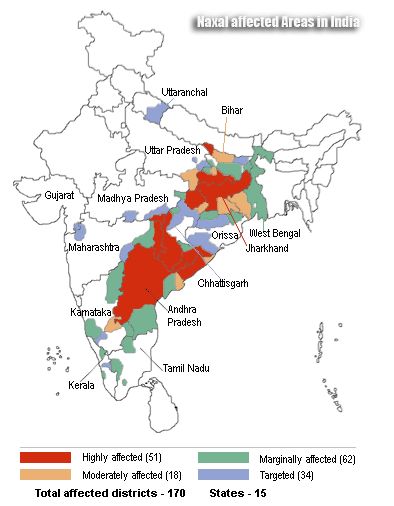
A lesser death toll in 2006 does not indicate waning of the Naxalite movement in India but the mounting disparities between the rich and poor only feeds the growing cadres.
Land reforms and a failed peace in Andhra Pradesh, growing industrial needs for land in Chhattisgarh, Jharkhand and Orissa causing displacement of people and resources, conflict of landed farmers and those without land in Bihar, rural poverty in Maharashtra and uprooting the firmly entrenched party cadres in West Bengal continue to be the hot bed for fermenting the Naxalite movement.
The highest causalities of Naxalite cadres, civilians or security personnel for 2006 too have been reported in these states. But with the ultra left Maoists movement having its tentacles spread across 170 districts in 13 states, the issue has been accorded an high priority law and order problem by the union government.
The sane appeal of Asian Centre for Human Rights to both the Communists Party of India (Maoists) and the security forces to show restrain and negotiate peace through dialogue would help to elevate the sufferings of thousands living under inhuman conditions.
Thousands of displaced persons living in relief camps under the Salwa Jundum campaign in Chhattisgarh because of the Naxalitie conflict are finding themselves trapped between the devil and the deep. Living under deplorable human conditions the about 44 thousand people are a soft collective target for the armed Maoist cadres. Of the 749 persons that fell victim to the bloody conflict in 2006 in the country, 363 causalities were in Chhattisgarh alone. In 2005, the conflict killed 892 people.
Until a development inclusive program for incorporating marginalized groups is not implemented in these Maoist infested districts; the law and order enforcement agencies are not better trained to tackle the problem more effectively; land reforms are not introduced; decent compensations for displacements caused by developmental or industrial projects are not awarded; proper health care and education not ensured; and the benefits of economic reforms do not percolate to these belts, the problem will continue to mount and threaten the very foundations of a nation that is looking forward to claim its position among the community of nations.
Map Courtsy: IBN LIVE




